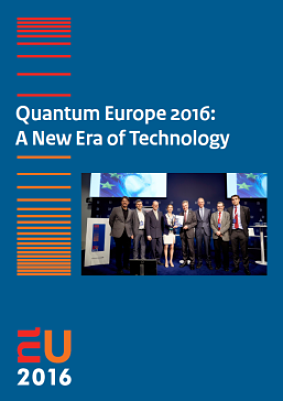Quantum Europe 2016: A New Era of Technology took place on 17 & 18 May 2016 and brought together high level representatives from industry, academia and policy communities. With the Netherlands being the 2016 location for the EU Presidency, Amsterdam was the venue for the two-day Quantum Europe conference. The conference kicked off with the announcement of the €1bn flagship for quantum technologies, in cooperation with the European Commission and the QuTech Centre for Quantum Technology.
The event was attended by top research groups in Europe plus others from around the world and in industry, including John Martinis from Google and Krysta Svore from Microsoft. As well as a significant press presence, a large contingent of non-scientists were present with EU ministers and officials attending, as well as funding agencies including the UK’s EPSRC.
The aim of the conference was to explain the current state of quantum technologies research, the potential applications and their speculative timelines for realisation. Four parallel sessions separately focused on computing, simulations, sensing, and communication.
As one of the five speakers in the computing session, Anthony discussed the role of photonics and CQP’s ambition for an all-photonic quantum computer. He laid out the QET Labs vision for a Bristol centred quantum eco-system with industrial and scientific development of quantum technologies and quantum engineers.
The QuTech/Delft perspective on fostering quantum technologies with strong industrial support was given by Lieven Vanderypen. Rainer Blatt explained ion trap digital and analogue quantum computing, and the need to build bridges between research and industry. While David DiVincenzo and IBM’s Fred Reiss discussed the broader scientific and industrial landscape for quantum technologies.
A panel discussion on the final day of the conference presented the state of quantum research outside of Europe. Panel member Charlie Marcus found an analogy for the transition to more collaborative and unified research that he says is required of European research groups in the quantum technologies endeavour.
Prof. Marcus pointed to a transition that young children make when they notice other nearby children playing the same game as them. One challenge, according to Marcus, is to move from a situation of parallel play to the more interesting and fruitful situation of coordinated group play.
Collaboration and cross-disciplinary efforts within and between institutions, with a strong industrial involvement can increase the economic and scientific return on the €1bn flagship. As Anthony explained in Amsterdam, this is precisely the model that has been developed in Bristol over recent years.
